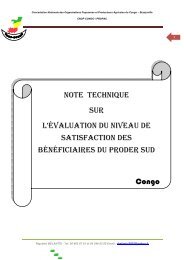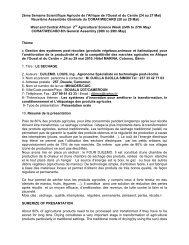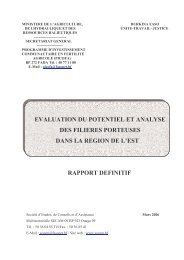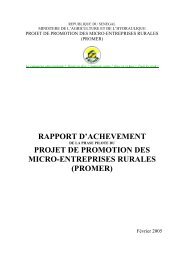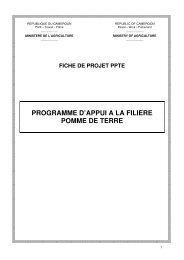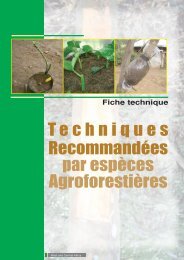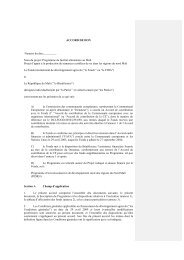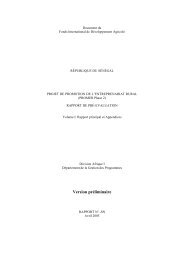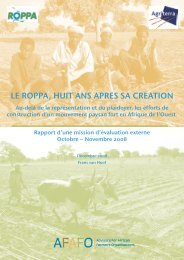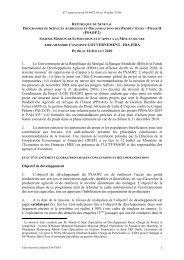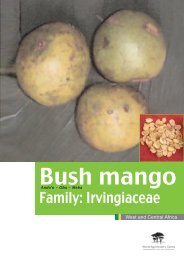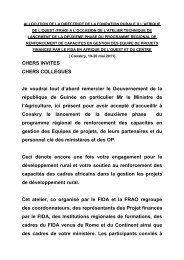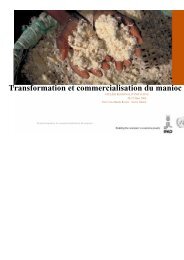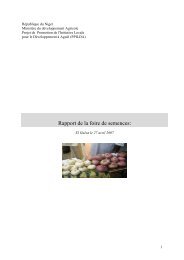Scaling Up the Fight Against Rural Poverty - FIDAfrique
Scaling Up the Fight Against Rural Poverty - FIDAfrique
Scaling Up the Fight Against Rural Poverty - FIDAfrique
You also want an ePaper? Increase the reach of your titles
YUMPU automatically turns print PDFs into web optimized ePapers that Google loves.
implement its particular program priorities (strict targeting, focus on <strong>the</strong> poorest and women, working<br />
through bottom up approaches) through SWAp arrangements. 36<br />
In this respect, <strong>the</strong> experiences in <strong>the</strong> Tanzania SWAp have been discouraging. Under <strong>the</strong> Tanzanian<br />
SWAp, approaches that IFAD developed in specific regions of <strong>the</strong> country were not maintained and<br />
were not adopted in o<strong>the</strong>r regions. IFAD is concerned that its approaches, which it nourishes often on a<br />
small scale, in particularly poor areas, and often with non-state implementation structures, tend to get<br />
squeezed out, if regional or national governments conduct <strong>the</strong> investment programming exercises by<br />
<strong>the</strong>mselves and donors only exercise limited specific influences. Moreover, as many agricultural<br />
SWAps are multisectoral and involve several ministries or government agencies, IFAD’s priorities,<br />
which are typically established toge<strong>the</strong>r with <strong>the</strong> Ministry of Agriculture, do not necessarily prevail.<br />
The concern by IFAD that SWAps are difficult to influence is warranted. But if IFAD-supported<br />
innovations are not readily adopted during SWAp preparation or implementation this should also be<br />
taken as a sign that <strong>the</strong>se innovations have not been internalized and accepted by <strong>the</strong> borrower.<br />
Innovations that clearly have been adopted by <strong>the</strong> borrower, such as <strong>the</strong> Tanzania warehouse receipt<br />
program, were also sustained in <strong>the</strong> SWAp program. The lack of continuation of IFAD programs<br />
during SWAps are thus not only evidence of <strong>the</strong> fact that SWAps are not suited for IFAD supported<br />
programs, but could also be evidence of <strong>the</strong> fact that IFAD supported programs have not, or at least<br />
not yet, been sufficiently accepted by <strong>the</strong> borrower.<br />
3. Policy dialogue – a key ingredient for scaling up<br />
Policy dialogue is a key instrument of IFAD’s scaling up agenda for two main reasons: First, policy,<br />
regulatory and legal space has to be assured to allow <strong>the</strong> replication and scaling up of successful<br />
interventions. And, second, changes in national-level policies, regulations and laws are a critical means<br />
for achieving nation-wide impact in improving <strong>the</strong> lives of <strong>the</strong> rural poor. As mentioned earlier, IFAD<br />
is now moving from area-based to national-level interventions, especially in smaller countries. But this<br />
makes sense only if IFAD is also able to engage in policy dialogue at <strong>the</strong> national level.<br />
According to <strong>the</strong> two most recent ARRIs, IFAD’s readiness to engage in policy dialogue at <strong>the</strong> country<br />
level and its capacity to pull toge<strong>the</strong>r <strong>the</strong> analytical underpinnings for it remain limited. Accordingly<br />
also, few COSOPs explain how policy dialogue is to be carried out. 37 And <strong>the</strong> joint AfDB-IFAD<br />
evaluation found policy dialogue for both institutions to be “generally inadequate”. (African<br />
Development Bank and IFAD, 2009) This is not surprising, considering <strong>the</strong> limited technical and<br />
analytical capacity that IFAD can muster for <strong>the</strong> preparation of its COSOPs and projects. Also, <strong>the</strong><br />
continuing constraints on IFAD’s field presence, especially of CPMs, act as a barrier. And <strong>the</strong> deeply<br />
ingrained tradition of IFAD to focus on <strong>the</strong> communities and eschew, where possible, engagement in<br />
<strong>the</strong> capital cities, remains a factor limiting <strong>the</strong> priority that IFAD gives to policy dialogue.<br />
One of <strong>the</strong> ways for IFAD to create <strong>the</strong> platform for such a dialogue is to build partnerships with<br />
national and regional knowledge centers, which can conduct much of <strong>the</strong> analytical work and<br />
participate in <strong>the</strong> policy dialogue to very good effect, as <strong>the</strong> experience in Latin America has shown,<br />
including in Peru. IFAD management has also committed to streng<strong>the</strong>n its organizational capacity and<br />
partnership with <strong>the</strong> World Bank and <strong>the</strong> o<strong>the</strong>r UN agencies for improved policy dialogue. 38<br />
36 IFAD, Portfolio Performance Mid-Year Review, Eastern and Sou<strong>the</strong>rn Africa Division, para. 201, July<br />
2009.<br />
37<br />
IFAD, ARRI 2009; IFAD, ARRI 2008<br />
38<br />
IFAD, ARRI 2009, p. 71<br />
41



